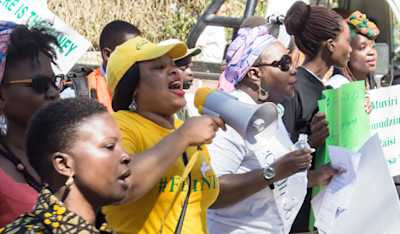
In my community, when a baby is born, we say “makorokoto, mapona, congratulations”, you survived.
These words, while celebratory, echo a painful reality for many women in Zimbabwe.
Childbirth remains perilous, especially in some underserved communities where access to timely medical care is often a luxury.
Among the most devastating consequences is obstetric fistula, a preventable and treatable condition that continues to trap women in cycles of pain, isolation, and stigma.
Obstetric fistula occurs when prolonged, obstructed labour creates a hole between the birth canal and bladder or rectum.
The result is chronic incontinence, often accompanied by a strong odour that drives women into isolation and economic marginalisation.
Most of these women suffer silently, not knowing their condition is curable, or too ashamed to seek help due to prevailing myths
Zimbabwe’s maternal mortality rate stands at 362 deaths per 100,000 live births (WHO, 2020), one of the highest in the region, and obstetric fistula plays a hidden role in this statistic.
- Mavhunga puts DeMbare into Chibuku quarterfinals
- Bulls to charge into Zimbabwe gold stocks
- Ndiraya concerned as goals dry up
- Letters: How solar power is transforming African farms
Keep Reading
Women in rural areas walk over 30 kilometres to the nearest clinic, often in advanced labour.
Even with commendable community health systems in place, referral delays, a lack of skilled birth attendants, and the absence of emergency obstetric care facilities at critical moments mean many women suffer preventable injuries during childbirth.
Once affected, these women are not only burdened by the physical pain and indignity of constant leakage; they are often abandoned by their spouses, excluded from community life, and unable to earn a living.
The trauma is compounded by the psychological toll of stigma, shame, and internalized guilt. In some traditional contexts, fistula is falsely attributed to witchcraft or divine punishment, further entrenching harmful narratives that dehumanize survivors.
But one may ask, ''what causes obstetric fistula ?'' Obstetric fistula is not merely a health issue, it is a painful symptom of deeply entrenched social, economic, and cultural inequalities therefore making it a human rights issue.
In Zimbabwe, the root causes are numerous and interconnected, but each carries a specific weight in shaping a woman’s risk of developing this condition.
For many families, accessing health care is simply too expensive. Even where public maternal services exist, hidden costs such as transport, medical supplies, or accommodation near clinics often push care out of reach.
In remote areas, expectant mothers may live over 30 kilometers from the nearest health facility.
Without reliable ambulances or maternity waiting homes, these women are left with no choice but to deliver at home or with unskilled birth attendants, drastically increasing the risk of prolonged and obstructed labour.
Even when women manage to reach a health facility, the care available may be limited or non-existent. Some clinics are not equipped to handle complications during labour.
They lack surgical capacity, blood transfusion services, or trained staff to conduct caesarean sections.
These delays or inadequacies in receiving emergency obstetric care are the direct cause of many fistula cases in Zimbabwe.
A woman may arrive in time, but if the system fails to respond quickly and effectively, she suffers the consequences.
Poverty remains one of the most persistent drivers of fistula. Poor families often cannot afford antenatal visits or nutritious food to ensure a safe pregnancy.
In many cases, poverty also drives young girls out of school and into early marriages, putting them at risk of complications during childbirth.
Furthermore, once a woman develops fistula, her ability to work and earn a living diminishes drastically, perpetuating the cycle of poverty and marginalization.
Certain religious beliefs, particularly among conservative Apostolic sects, contribute significantly to poor maternal health outcomes.
These sects often reject modern medicine, encouraging women to deliver at home or with spiritual healers rather than trained professionals.
In many cases, this spiritual stance is reinforced by patriarchal teachings that discourage women from seeking external help, even in emergencies. The result is preventable injury—and in many cases, preventable death.
Early pregnancy leaves child brides vulnerable to obstetric fistula, a preventable yet debilitating injury resulting from obstructed labour or prolonged childbirth.
Zimbabwe continues to face high rates of child marriage, especially in rural provinces.
Young mothers, particularly those who are adolescents, are more prone to obstructed labor due to their underdeveloped pelvises, which can lead to obstetric fistula.
Teenage pregnancies also correlate with reduced access to prenatal care and low decision-making power within relationships, further compounding the risk.
In Zimbabwe, it is estimated that hundreds of women live with untreated fistula, with only a small fraction accessing the life-transforming surgery available through campaigns led by the Health and Child Care ministry, UNFPA and other partners.
These interventions, while impactful, often focus only on clinical repair, neglecting the essential needs for psychosocial reintegration and community education.
That is why Amnesty International Zimbabwe is launching a campaign, the end Obstrectic fistula campaign to sensitise communities on obstetric fistula.
Authorities need to decentralise surgical and psychosocial support for obstetric fistula repair in Zimbabwe, as current services are limited and centralised.
Mobile surgical outreach programmes should be implemented to reach remote districts.
Additionally, survivors face emotional trauma, social stigma, and isolation; thus, integrating trauma-informed mental health care and peer support into recovery is essential for holistic healing.
The government and partners must prioritize training and retaining surgeons with fistula-specific expertise.
Increased community education is essential to address misconceptions and stigma around obstetric fistula, which hinder early intervention.
Public education campaigns should blend mass communication tools (like radio and SMS) with local storytelling, highlighting survivors as change agents.
Campaigns must be culturally sensitive and in local languages, addressing myths like fistula being a curse.
These campaigns should present obstetric fistula as a preventable and treatable medical condition, referring individuals to the Ministry of Health at 08080231.
Faith leaders, traditional authorities, and educators need accurate information to spread these messages effectively.
Male engagement is another important factor. The burden of maternal health should not rest solely on women.
Men, as mostly decision-makers in our culture, fathers, partners, and community influencers, must be intentionally engaged in both prevention and care.
Zimbabwe should institutionalize male involvement in maternal health by adopting and adapting successful models like Sierra Leone’s “Men as Partners” program, which trains men in birth preparedness, respectful relationships, and postnatal support.
This effort must be embedded into national maternal health policy and budgeting processes, with incentives for community health workers to recruit and support male champions.
Investment in health infrastructure in underserved areas is critical, as many fistula cases stem from delays in accessing emergency obstetric care.
Additionally, investing in rural maternity waiting homes can help reduce delays due to distance and terrain.
The government, in collaboration with CSOs, should introduce comprehensive school reintegration policies that include tuition waivers, counselling, and peer support mechanisms. For those who cannot return to formal education, vocational training tailored to market demands should be provided, along with seed funding and mentorship for business startups.
These efforts are not just about livelihood—they restore dignity, agency, and a future that girls thought they had lost.
As we observed International Day to End Obstetric Fistula on May 23, let us be reminded that it is not just a medical condition, it is a gender justice issue, from now on moving forward .
It speaks to how much value society places on women's health, dignity, and autonomy. If we are to build an inclusive Zimbabwe, we must confront the structural inequalities that cause and perpetuate this suffering.
So that we no longer say “makorokoto, mapona” out of relief, but rather “makorokoto, wakachengetedzwa”—congratulations, you were cared for. With collective action, political will, and men standing in solidarity, we can consign obstetric fistula to the past and restore dignity to every woman.
*Alfa Bothwell Gwatidzo is a social worker, researcher and Amnesty International Zimbabwe sexual and reproductive health rights champion and advocate.











